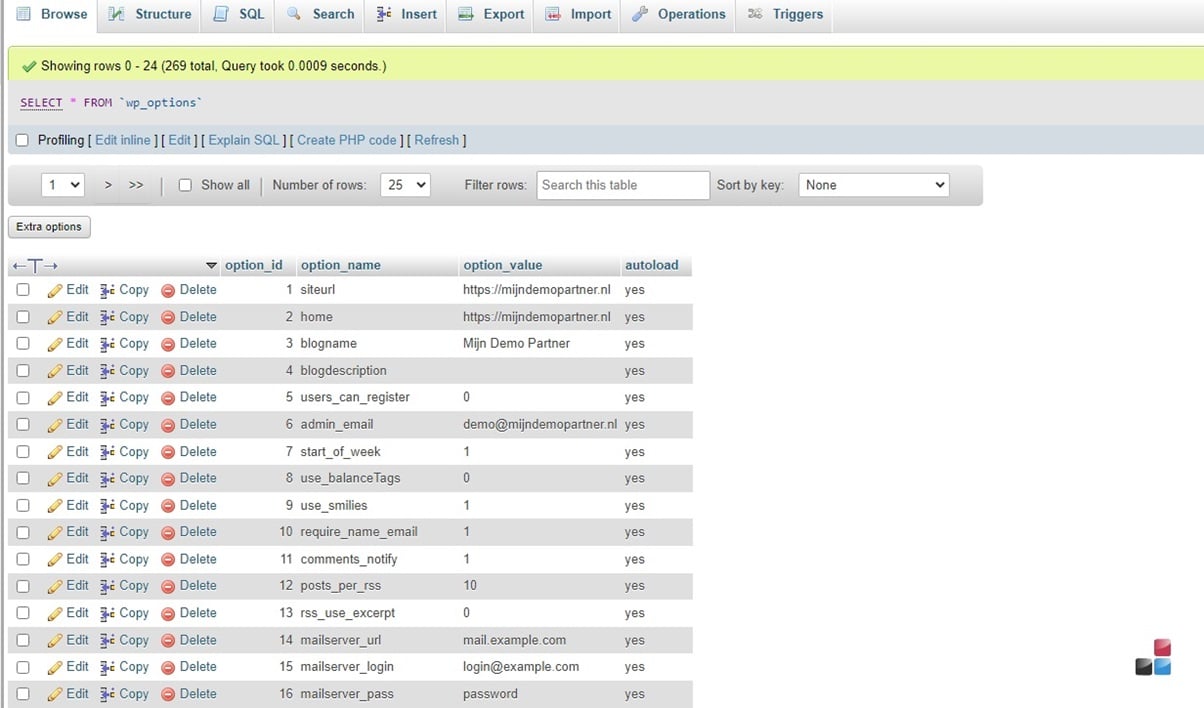Important tables in a WordPress database
If you have ever managed a WordPress website, you are most likely already familiar with the WordPress database, but do you know exactly what is going on in it? A WordPress database contains the data needed to run your website, such as posts, pages, user information and settings. In this blog post, we'll take a closer look at the most important tables in a standard WordPress database and explain what role they play.
What is a WordPress database?
The WordPress database is the heart of your website, and without it, your WordPress website will not function. For this reason, it's good to understand exactly what a WordPress database is. A database is an organized collection of data that is stored in a structured way. WordPress uses MySQL or MariaDB as a database system in which the data is stored in tables. Each table contains specific information that is important for the functionality of your WordPress website.
The most important WordPress tables
A standard WordPress installation has 12 tables. Let's take a look at the most important ones and understand what they do:
1. wp_posts: The content of your website
The wp_posts table is the heart of your WordPress website. It stores all content, such as posts, pages, attachments and custom post types.
Each row in this table represents a separate piece of content. Important columns: ID: The unique identifier for each post or page. post_title: The title of the post. post_content: The content itself. post_type: Indicates whether it is a blog post, page, attachment or other custom post type.
2. wp_postmeta: Additional information about posts
In addition to the main information stored in wp_posts, a post can contain additional data that is stored in the wp_postmeta table.
For example, think of custom fields that you use for custom functions or plugin settings. Important columns: post_id: Reference to the ID in the wp_posts table. meta_key: The name of the metadata, e.g. "_thumbnail_id" for featured images. meta_value: The value of the metadata.
3. wp_users: User information.
Each registered user on your WordPress website has an entry in the wp_users table.
This table contains data such as the username, hashed password and email address of each user. Important columns: ID: The unique identifier for each user. user_login: The username. user_pass: The hashed password in MD5 encryption (not readable in plain text). However, this algorithm is not up to date and should be updated.
An upgrade is due. user_email: The user's e-mail address.
4. wp_usermeta: Additional user information.
Just as the wp_postmeta table contains additional information about posts, the wp_usermeta table stores additional data about users.
Important columns: user_id: Reference to the ID in the wp_users table. meta_key: Name of the metadata, e.g. "nickname" or "wp_capabilities". meta_value: The value of the metadata.
5. wp_terms, wp_term_taxonomy and wp_term_relationships: Manage categories and tags.
These three tables work together to manage taxonomies (e.g. categories and tags): wp_terms: Contains the name and slug (URL-friendly name) of each term. wp_term_taxonomy: Specifies which taxonomy (e.g. category, tag) a term has. wp_term_relationships: Links terms to posts so that a post can be linked to multiple categories and tags, for example.
6. wp_options: Settings and configuration.
The wp_options table contains all the settings of your website, including the website URL, theme options and plugin configurations.
This table plays a crucial role in managing the overall configuration of your website. Important columns: option_name:
The name of the option (e.g. "siteurl" for the website URL). option_value: The value of the option.
7. wp_comments and wp_commentmeta: Management of comments
WordPress has a built-in function for comments, and this data is stored in the wp_comments table.
The wp_commentmeta table stores additional information about the comments, e.g. metadata for moderation or user-defined fields. Important columns in wp_comments: comment_ID: The unique identifier for each comment. comment_post_ID: Reference to the post to which the comment belongs. comment_author: Name of the author of the comment. comment_content: The content of the comment.
Why is it important to understand these tables?
Knowing the WordPress database and its tables will help you better manage your site, troubleshoot issues, and even optimize performance.
Here are some scenarios where this can be useful: Database optimization: if you know which tables contain a lot of data, you can make optimizations. For example, if you see that a plug-in is returning tables that you no longer use, you can delete these tables so that there are no unnecessary tables and data.
Of course, before you do anything, you should create a backup for this situation. Backup and restore: If you know which tables are important, you can more easily perform targeted backups. Customize functionality: If you want to create custom functionality such as custom post types or custom fields, you need to know how the data is structured in the database. The WordPress database is the heart of your website and contains all the information needed to keep it running smoothly.
Understanding how the different tables work together will help you better meet the needs of your website, optimize performance and resolve issues faster. Make sure you create regular backups and optimize your database to keep your WordPress website secure and fast. Is your website still using a MySQL 5 database? Then it's time to switch to a MySQL 8 or MariaDB database. This will give you the best results and the highest speed for your WordPress website. Read our nextknowledge base article to find out how to do this.
